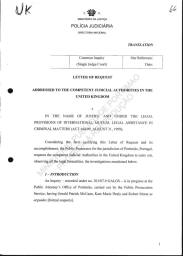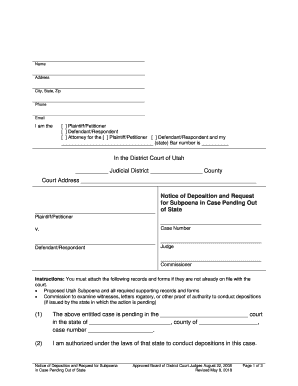Exploring the Historical Background of Letters Rogatory in Legal Frameworks
The Function of Letters Rogatory in International Regulation: Trick Insights
Letters rogatory serve as a critical instrument in worldwide legislation, assisting in cross-border lawful aid by permitting territories to officially ask for proof and activities from each other. Rooted in historic criteria and defined with contracts like the 1970 Hague Convention, these demands are necessary for promoting worldwide teamwork. Their application typically experiences significant difficulties, consisting of inconsistencies in legal criteria and step-by-step delays, which can prevent their efficiency. Comprehending the nuances of this procedure increases crucial questions concerning worldwide collaboration and the possible reforms needed to enhance its integrity. What ramifications might these challenges have for future lawful proceedings?
Definition of Letters Rogatory
In the world of worldwide law, letters rogatory act as formal demands issued by a court in one territory to look for help from a court in an additional jurisdiction. Letters rogatory. These demands are especially substantial in cross-border legal process, where the enforcement of a court's order or the gathering of evidence might be hindered because of administrative limitations

The procedure typically requires the asking for court to verbalize the specific details or action needed from the international court, adhering to the legal methods and conventions established in between the jurisdictions involved. As soon as issued, the letters rogatory are transmitted via diplomatic networks, which may consist of consulates or consular offices, to guarantee that the request is acknowledged and acted upon by the international court. In general, letters rogatory exhibit the cooperative structure necessary for effective global legal procedures.
Historical Context
Although the practice of letters rogatory has old roots, its formalization within the structure of international legislation arised substantially in the 20th century. Historically, such ask for judicial support were made use of in different lawful traditions, consisting of Roman law, where they assisted in cross-border cooperation in legal issues. The principle acquired restored attention with the increase of globalization and the raising complexity of worldwide lawful interactions.
The mid-20th century saw the facility of treaties and conventions that sought to standardize the procedure of letters rogatory. Especially, the 1970 Hague Convention on the Taking of Evidence Abroad in Civil or Industrial Issues supplied an organized strategy, enhancing the effectiveness of these demands - Letters rogatory. This duration noted a shift from informal arrangements to an extra organized structure, which addressed the challenges presented by varying nationwide legal systems
As states ended up being extra synergistic, the need for effective systems to gather evidence across boundaries came to be noticeable, enhancing the role of letters rogatory in helping with international participation. Today, they continue to be a crucial instrument for acquiring evidence and guaranteeing that justice transcends national boundaries, reflecting the evolving nature of international law in response to global obstacles.
Refine of Issuing Demands
The procedure of releasing letters rogatory commonly entails numerous essential actions created to make sure that ask for judicial help are clear, certain, and compliant with both global and residential lawful requirements. Initially, a party looking for help needs to prepare a formal request that lays out the significant realities of the situation, the relief looked for, and the certain evidence or testimony called for. This paper must be crafted with accuracy to satisfy the lawful demands of the jurisdiction in which it will certainly be submitted.
Adhering to the preparation of the demand, it is submitted to the appropriate authority, usually a court or an assigned governmental agency. This authority examines the request to guarantee it complies with step-by-step norms and lawful standards. When accepted, the request is sent to the foreign territory through diplomatic networks.
Upon receipt, the international court evaluates the demand's conformity with its regional regulations and practices (Letters rogatory). If approved, it continues to perform the demand, which might involve the issuance of subpoenas or the collection of proof. Throughout this procedure, maintaining clear interaction in between the requesting and getting territories is he said essential to make certain successful collaboration and the gratification of the request
Difficulties and Limitations
Obstacles and constraints regularly arise in the process of carrying click to read out letters rogatory, commonly coming from varying legal systems and treatments in between jurisdictions. One considerable barrier is the differing standards of admissibility for evidence, which can cause difficulties in the acceptance of documentation requested with letters rogatory. Furthermore, the absence of harmony in lawful terms and interpretations can create misunderstandings, complicating communication between courts in different countries.
Furthermore, delays are typical as a result of governmental procedures, as the demand might require to pass via numerous layers of lawful authorities prior to it is met. In some circumstances, the asked for territory may lack the required resources or determination to work together, even more hindering the process. Language barriers additionally add to obstacles, as exact translation of lawful papers is vital for making sure that the designated message is communicated without distortion.
Lastly, sovereignty concerns may emerge, as some states are unwilling to conform with requests that they perceive as infringing upon their lawful freedom. These difficulties highlight the complexities inherent in the usage of letters rogatory, requiring higher harmonization and cooperation amongst worldwide legal systems to enhance their performance.

Impact on International Collaboration
Acknowledging the value of letters rogatory in fostering international collaboration is vital, as these demands facilitate cross-border legal support and promote collective initiatives in civil and criminal issues. By making it possible for one territory to officially ask for aid from an additional, letters rogatory develop an organized lawful structure that boosts the efficiency of international interaction in between judicial authorities.
Making use of letters rogatory aids to develop common trust fund and regard amongst countries, which is crucial in a significantly interconnected globe. They act as a device not just for gathering evidence but also for ensuring that lawful procedures are maintained throughout borders. This is particularly important in combating transnational criminal activity, where the lack of ability to safeguard teamwork can weaken justice.
Furthermore, the reliance on letters rogatory can simplify intricate legal procedures, reducing hold-ups and uncertainties in global investigations. The procedural safeguards inherent in this procedure add to the protection of specific legal rights while assisting in collaboration amongst states. Inevitably, the effect of letters rogatory on international participation highlights their role as essential devices in the promotion of justice, cultivating a collective spirit that goes company website beyond legal systems and nationwide boundaries.
Verdict
To conclude, letters rogatory function as an essential instrument in global law, promoting cross-border legal aid and teamwork. Despite intrinsic challenges such as varying lawful requirements and governmental delays, their standardized treatments advertise count on amongst nations. The continued advancement of these mechanisms is necessary for enhancing the efficiency of global legal processes, inevitably fostering stronger cooperation in both civil and criminal matters throughout territories. The importance of clear communication in this context can not be overemphasized.
Letters rogatory serve as an essential tool in worldwide legislation, promoting cross-border lawful help by permitting territories to officially ask for proof and activities from one an additional.The procedure normally needs the asking for court to verbalize the certain info or action needed from the foreign court, adhering to the legal methods and conventions developed in between the territories included. Historically, such requests for judicial support were utilized in various legal practices, consisting of Roman regulation, where they assisted in cross-border teamwork in legal matters.The process of releasing letters rogatory commonly entails a number of vital steps designed to make certain that demands for judicial help are clear, particular, and compliant with both residential and global lawful requirements.Furthermore, hold-ups are usual due to administrative processes, as the demand may require to pass with multiple layers of lawful authorities prior to it is satisfied.